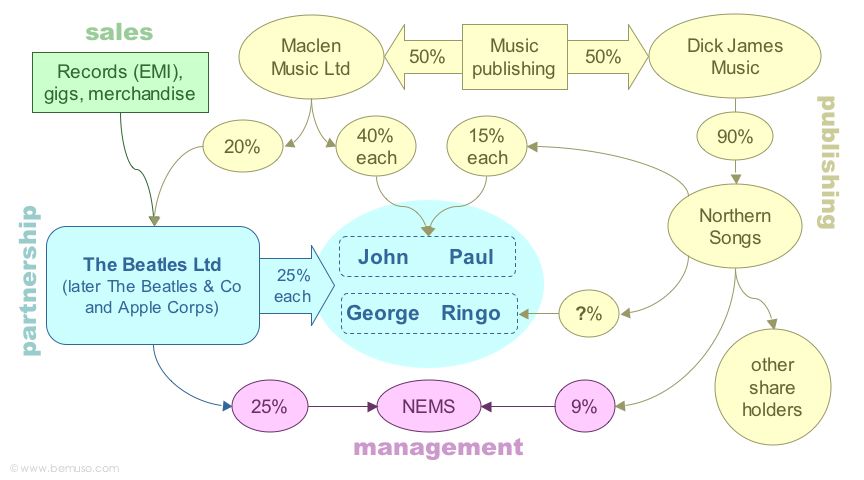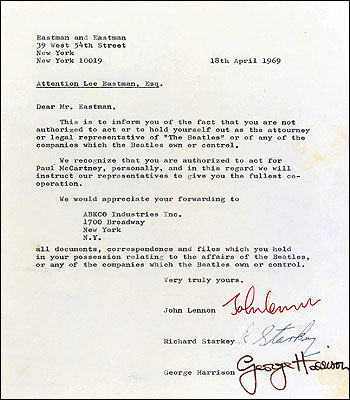
Related pages: Recommended books about The Beatles • Timeline of The Beatles main events and creative output
To lift the lid on the music industry, it’s useful to read about a band you like. Any successful band will do, but The Beatles are particularly useful. Today’s music business was largely invented in the mid-Fifties and early Sixties.
In 1960 there were no record shops—you’d buy mono records at a counter in the furniture shop that sold gramophones. Although there were short-lived pop TV programmes in the late Fifties, there was no pop music radio in the UK and you could only hear chart records on the BBC. Young people endured their parents’ music to hear the occasional pop tracks on Two-Way Family Favourites (a programme for servicemen and their families) or Pick of the Pops. There were no DJs in the UK until the mid-Sixties and the best music was on Radio Luxembourg, a European AM station with very poor reception. Bands had virtually no amplification. Decent instruments were expensive and hard to find, and you couldn’t get guitar strings in most towns. There were no samplers or synthesisers. The venues were theatres, cinemas and ballrooms.
By 1970 we had stereo, Mellotrons, Moogs, Virgin, Radio One (a poor substitute for the outlawed pirate stations), music festivals, stadium rock and a sales chart where easy listening, middle of the road and musicals were rare. The Who, The Kinks, The Small Faces, The Stones, influences from the USA and many others played a part but The Beatles were central. They also covered most areas of the business: gigging and touring, recording, writing and publishing, films, merchandise and even retail.
The Beatles are probably the best documented band of all time. The press logged a huge amount of information, The Beatles and their entourage were great communicators, EMI kept very good records and researchers have spent years on the subject.
Here are some of the basics of The Beatles business. I strongly recommend reading up on the band and the background. Brian Epstein wasn’t a music manager, George Martin wasn’t a pop producer, Parlophone wasn’t a pop label and Dick James was new to publishing. Some people criticise the deals they made, but experienced managers have made worse mistakes since.
These are the main companies involved in The Beatles business in the Sixties, roughly in the order they occurred. There were many others, including several companies for their films, investments and other territories.
| Business | Companies and deals |
|---|---|
| Management |
|
| Recording |
|
| Publishing |
|
| Songwriting |
|
| Partnership |
|
| Merchandise |
|
This is roughly what The Beatles business looked like in 1965 when Northern Songs was floated on the Stock Exchange.

It’s hard to say exactly how the business was organised without access to financial records and contracts, so this is an informed guess. Various sources give different values, percentages and shares. This is probably down to guesswork, different viewpoints and the fact that circumstances changed over time. Shares in Northern Songs weren’t all the same type, and once trading began their value changed. Paul had more shares than John by April 1969, and it’s likely that George and Ringo had shares for their publishing up to 1968 when their contracts ended. NEMS 25% came off the top and EMI, for example, used to pay Epstein’s management commission direct.
Beatle Money has more detail about various angles but it’s not possible to reconcile all the different papers and memoirs precisely.
Brian’s death left The Beatles business in disarray. He had considered selling 51% of NEMS to Robert Stigwood in March 1967 but the deal fell through and Stigwood later left NEMS (taking the Bee Gees and Cream) to form RSO. Brian had also planned for what would become Apple Corps, but legal and financial disputes resulting from his death and The Beatles’ breakup continued into the late 1980s.
| Losing Northern Songs | Buying NEMS | Apple Corps | |
|---|---|---|---|
| 1965 | February 1965 Northern Songs was set up in 1963 and floated on the Stock Exchange in February 1965 with an issue of 5 million shares. | ||
| 1967 | August 1967 Brian Epstein left NEMS (now Nemperor Holdings Ltd) to his family. Death duties were due by the end of the next financial year, 31 March 1969. Clive Epstein put NEMS up for sale, and though Brian’s management contract ran out in October 1967 he still claimed NEMS 25%. | ||
| December 1967 Some Apple companies started in 1967. The Apple Boutique opened on 5 December and Apple Music signed Grapefruit on 11 December. Apple Corps was finally set up in January 1968 and the other companies were re-shuffled. | |||
| 1969 | February 1969 EMI loaned The Beatles enough to buy NEMS but Klein dissuaded them. Clive Epstein sold control of NEMS to Leonard Richenberg (Triumph Investment Trust) on 17 February. The Beatles instructed EMI not to pay any more royalties to NEMS and Triumph sued for NEMS’ 25%. | February 1969 Allen Klein (Abkco) offered to review John, George and Ringo’s finances in January. Paul declined. Abkco acted as financial adviser to the others while Paul used Linda’s father. Eastman and Eastman were appointed as Apple’s General Counsel. | |
| March 1969 Dick James and Charles Silver sold their share of Northern Songs to Lew Grade’s ATV Music without telling The Beatles. ATV immediately made a bid for control of Northern Songs—the offer deadline was May 1969. | |||
| April 1969 The Beatles rejected ATV’s offer on 10 April and made a £2 million counter-bid for Northern Songs. They had enough backing with a City consortium controlling 14% of Northern Songs, but negotiations broke down over conditions demanded by the consortium. | April 1969 Klein made a deal with Richenberg (24 April) which gave The Beatles control of NEMS, Nemperor, Subafilms, and some Triumph and NEMS Northern Songs stock. Triumph’s 25% “management fee” was cut to 5% for the last 5 years of the contract from 1972 to 1976. | ||
| May 1969 ATV gained control on 19 May 1969. | May 1969 John, George and Ringo formally appointed Allen Klein to handle their business interests and Abkco managed Apple from 8 May 1969 to 31 March 1973. |

Paul agreed with winding down Apple, but held back from endorsing Allen Klein and financing the bid for Northern Songs. He didn’t approve the Phil Spector production of Let It Be and after Abbey Road had little to do with Apple until the Anthology project in the 1990s.
Here is a simple list of Beatle record and film titles (including LPs, EPs and singles) in UK release date order. Double A sides are also shown.
| Release | Title | Date | |
|---|---|---|---|
| 1962 | Single | Love Me Do / P.S. I Love You | 5.10.62 |
| 1963 | Single | Please Please Me / Ask Me Why | 11.1.63 |
| Album | Please Please Me | 22.3.63 | |
| Single | From Me To You / Thank You Girl | 11.4.63 | |
| EP | Twist and Shout | 12.7.63 | |
| Single | She Loves You / I’ll Get You | 23.8.63 | |
| EP | The Beatles’ Hits | 6.9.63 | |
| EP | The Beatles (No 1) | 1.11.63 | |
| Album | With The Beatles | 22.11.63 | |
| Single | I Want To Hold Your Hand / This Boy | 29.11.63 | |
| 1964 | EP | All My Loving | 7.2.64 |
| Single | Can’t Buy Me Love / You Can’t Do That | 20.3.64 | |
| EP | Long Tall Sally | 19.6.64 | |
| Film | A Hard Day’s Night | 6.7.64 | |
| Album | A Hard Day’s Night | 10.7.64 | |
| Single | A Hard Day’s Night / Things We Said Today | 10.7.64 | |
| EP | Extracts From The Film A Hard Day’s Night | 6.11.64 | |
| EP | Extracts From The Album A Hard Day’s Night | 6.11.64 | |
| Single | I Feel Fine / She’s A Woman | 27.11.64 | |
| Album | Beatles For Sale | 4.12.64 | |
| 1965 | EP | Beatles For Sale | 6.4.65 |
| Single | Ticket To Ride / Yes It Is | 9.4.65 | |
| EP | Beatles For Sale (No 2) | 4.6.65 | |
| Single | Help! / I’m Down | 23.7.65 | |
| Film | Help! | 29.7.65 | |
| Album | Help! | 6.8.65 | |
| Album | Rubber Soul | 3.12.65 | |
| Single | We Can Work It Out / Day Tripper (double A) | 3.12.65 | |
| EP | The Beatles’ Million Sellers | 6.12.65 | |
| 1966 | EP | Yesterday | 4.3.66 |
| Single | Paperback Writer / Rain | 10.6.66 | |
| EP | Nowhere Man | 8.7.66 | |
| Album | Revolver | 5.8.66 | |
| Single | Yellow Submarine / Eleanor Rigby (double A) | 5.8.66 | |
| Album | A Collection Of Beatles Oldies | 9.12.66 | |
| 1967 | Single | Penny Lane / Strawberry Fields Forever (double A) | 12.2.67 |
| Album | Sgt. Pepper’s Lonely Hearts Club Band | 1.6.67 | |
| Single | All You Need Is Love / Baby You’re A Rich Man | 7.7.67 | |
| Single | Hello Goodbye / I Am The Walrus | 24.11.67 | |
| EP | Magical Mystery Tour | 8.12.67 | |
| Film (TV) | Magical Mystery Tour | 26.12.67 | |
| 1968 | Single | Lady Madonna / The Inner Light | 15.3.68 |
| Film | Yellow Submarine | 17.7.68 | |
| Single | Hey Jude / Revolution | 30.8.68 | |
| Album | The Beatles | 22.11.68 | |
| 1969 | Album | Yellow Submarine | 17.1.69 |
| Single | Get Back / Don’t Let Me Down | 11.4.69 | |
| Single | The Ballad Of John And Yoko / Old Brown Shoe | 30.5.69 | |
| Album | Abbey Road | 26.9.69 | |
| Single | Something / Come Together (double A) | 31.10.69 | |
| 1970 | Single | Let It Be / You Know My Name (Look Up The Number) | 6.3.70 |
| Album | Let It Be | 8.5.70 | |
| Film | Let It Be | 20.5.70 |
There are more detailed timelines of The Beatles story and recordings here.